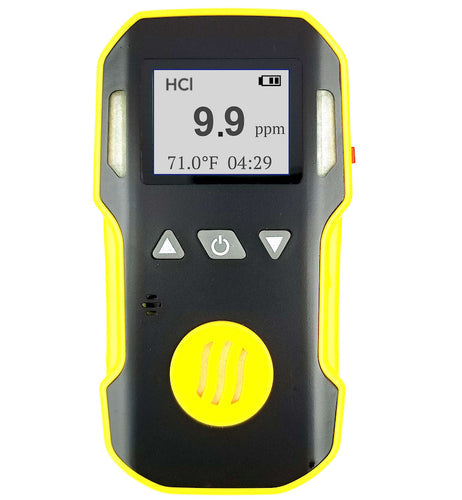A hydrogen chloride (HCl) gas detector, or HCl detector, is a crucial device for detecting and monitoring the concentration of hydrogen chloride gas in the air. These gas meters are essential for personal protection in environments where toxic HCl gas may be present. Hydrogen chloride is widely used in various industries, including cleaning, pickling, electroplating, leather tanning, refining, and numerous chemical processes. Additionally, HCl is employed in the treatment of oil and gas wells. By accurately measuring the levels of HCl gas in the air, these detectors help ensure the safety of individuals working in or around these processes, alerting them to potentially dangerous concentrations of this harmful gas.
Pros |
Cons |
|
✅ Small and low cost HCl detectors helps with worker safety. ✅ HCl gas detectors are available for less than $399. ✅ Excellent tool for exposure protection in lab or manufacturing environments. ✅ Detection means protection. |
⛔ Bump testing and calibration can be forgotten by users. ⛔ Sensors typically last from 24 to 36 months. ⛔ Along with high toxicity, hydrogen chloride toxic and an acid. |
Best Hydrogen Chloride Gas Detector?
There are many hydrogen chloride gas detectors on the market. The reputable brands include the following:
- Forensics Detectors Hydrogen Chloride Detector
- RC Systems Hydrogen Chloride Detector
- Draeger HCl Detector
- Honeywell HCl Gas Detector
What Is a HCl Gas Detector?
A hydrogen chloride (HCl) gas detector is an instrument used to detect the concentration of HCl in the air or in a toxic environment. These devices (specifically the Forensics Detectors FD-90A-HCl) have a long-life battery, clear screen that displays the HCl concentration in ppm, and a belt clip to connect to clothing or a bag. In order to protect users, these gas detectors also have LED, vibration, and buzzer alarms to warn in dangerous situations.
Hydrogen chloride gas detectors are also known as HCl monitors, hydrogen chloride meters, hydrogen chloride analyzers, and HCl gas detectors. These names all refer to the same device, an HCl gas meter.
What Does a Hydrogen Chloride Detector?
A hydrogen chloride detector senses HCl gas and displays the levels in parts per million (ppm).
The growth of hydrogen chloride detectors has increased due to higher use of HCl in the fuel and steel industries. The harmful effects of HCl on human health and the environment warrant the use of HCl gas detectors to ensure inhalation safety when using this gas.
What Is Hydrogen Chloride Gas?
Hydrogen chloride has the chemical symbol HCl. This gas is colorless or slightly yellow with a pungent smell. HCl is a very useful but dangerous gas. Due to is useful uses, it is employed in various situations, yet requires monitoring to protect humans from inhalation.
When liquified, hydrogen chloride is known as anhydrous hydrochloric acid, hydrochloric acid, hydrochloride, spirits of salt, or muriatic acid.
Is Hydrogen Chloride Gas Toxic?
Yes it is.
When exposed to hydrogen chloride gas, you may experience coughing, pain, inflammation, eye irritation, respiratory illness, and even death. Avoiding hydrogen chloride exposure is essential to avoid occupational hazards.
When inhaled, the dissolution of HCl gas in lung water can produce hydrochloric acid. This reaction leads to pulmonary toxicity, respiratory distress, and other issues.

Is Hydrogen Chloride Gas Bad for the Environment?
Yes it is.
Hydrogen chloride gas released into the outdoor environment will be incorporated into clouds and rainfall. The United States EPA enforces HCl emissions through the Clean Air Act. In 2021, the agency identified emission violations at metal recycling facilities. Using HCl monitoring systems, these companies can confirm that their emissions do not exceed predefined thresholds.
Can Hydrogen Chloride Gas Make Hydrochloric Acid?
Hydrogen chloride gas and hydrochloric acid have the same chemical formula, HCl. Hydrochloric acid is an aqueous solution, formed when hydrogen chloride dissolves in water. HCl gas is very soluble, and will even cause hydrochloric acid aerosol in humid air.
What Should I Do If I've Been Exposed to Hydrogen Chloride Gas?
If you suspect that you have been exposed to hydrogen chloride gas, it is important to evacuate to an outdoor environment with no traces of HCl exposure. Seek medical attention immediately. Medical professionals can help manage symptoms such as reduced respiratory or heart function.
Preventing exposure is important for safety and can be achieved with an HCl gas detector.
Can I Smell Hydrogen Chloride Gas?
Yes, humans can smell hydrogen chloride gas. It is described to have a pungent and irritating odor.
The hydrogen chloride odor threshold is between 0.3 and 0.8 ppm. See here.
What Are the Different Types of Hydrogen Chloride Gas Detectors?
Hydrogen Chloride Detector for Personal ProtectionThe majority of hydrogen chloride gas detectors are portable. These are small, battery-powered units with a hydrogen chloride sensor that can be clipped onto your clothes for personal protection. They typically come in two different versions. Diffusive models allow the HCl gas molecules to naturally diffuse to the sensor head. On the other hand, pump-based detectors include an internal or external micro-pump that moves air over the sensor head. These devices sometimes incorporate probes for point sampling uses.  |
Hydrogen Chloride Gas Monitor for Stationary Fixed WallWall-mounted units provide continuous protection and warning of hydrogen chloride gas leaks. These devices are perfect for indoor uses. If the levels pass the preset threshold (i.e., 5 ppm OSHA TWA), the unit will provide an LED and buzzer warning.  |
How Does a Hydrogen Chloride Gas Sensor Work?
A hydrogen chloride gas detector is composed of electronics and an HCl sensor. The gas sensor converts the detected gas concentration to an electronic signal for analysis by the onboard microprocessor. After receiving the electrical signal, the processor displays the HCl concentration reading. If the measurement exceeds the pre-set alarm value, the alarms are triggered.
Gas |
Sensor Technology |
Pros |
Cons |
|
Hydrogen Chloride (HCl) |
Electrochemical Sensors The gas reacts with a working electrode, triggering an electrochemical redox reaction. The generated current is proportional to the detected gas level. |
|
|
What Are Safe Hydrogen Chloride Gas Levels?
Various government agencies have recommended gas exposure limits, examples can be seen below:
Agency |
Recommendation / Requirement |
|
National Institute for Occupational Safety and Health (NIOSH) |
NIOSH Recommended Exposure Limit (REL): 5 ppm, 10-hour TWA 5 ppm, 10-minute ceiling |
|
Occupational Safety and Health (OSHA) |
5 ppm average over 8 hours 5 ppm average over 15 minutes (Permissible Exposure Limit) |
|
American Conference of Governmental Industrial Hygienists (ACGIH) |
2 ppm average over 8 hours |
What Is a Hydrogen Chloride Gas Detector Used For?
Hydrogen chloride gas is used in a variety of manufacturing and industrial processes, as listed below. Because HCl is toxic, it is important to monitor for employee and homeowner safety.
- HCl for chemical synthesis: This gas is used mainly in the production of hydrochloric acid, PVC, and fluorocarbons. In addition, many chemical processes recycle HCl to produce chlorine. Hydrogen chloride is essential in the production of plastics, polymers, rubber, fertilizers, and dyes.
- HCl in metal handling: Hydrogen chloride gas is used to pickle, or clean, steel. This prepares the surface for further coating treatments. The gas is used widely throughout industry due to its ability to dissolve metal oxides. HCl is also used to manufacture titanium and magnesium.
- HCl in the oil and gas industry: Anhydrous hydrogen chloride gas is used to activate oil wells for fuel extraction. This gas is important for bringing petroleum, coal, and gas to the surface.

How Do I Select a Hydrogen Chloride Detector?
To select the best hydrogen chloride gas detector, follow this simple guide:
- What do I need it for?
- Personal protection?
- Measuring HCl levels in factories?
- Continuous monitoring?
- Do I need advanced functions such as data-logging or Bluetooth?
- Do I need specific accreditations with the monitor such as ATEX or a NIST traceability calibration certificate?
- Do I require any features such as a belt clip?
- Do I value USA support or fast calibration services?
How Long Does a Hydrogen Chloride Sensor Last For?
Hydrogen chloride detectors incorporate electrochemical sensors that last between 24 and 36 months.
How Do I Test My Hydrogen Chloride Detector?
The best way to test your hydrogen chloride gas detector is to expose it to a known HCl gas source. HCl bump testing is a good practice to perform daily. Frequent testing is especially important in personal protection HCl applications where safety is paramount.
What Is Hydrogen Chloride Detector Gas Calibration?
Hydrogen chloride gas detector calibration is the technical task of adjusting the detector to a more accurate gas reading. Over time, the HCl electrochemical sensor on the device will degrade or produce drifting readings. We suggest calibrating your HCl detector every 6 to 12 months, the typical time period for gas detectors. Here are some tips:
- Gas HCl calibration is a technical task that requires certain key pieces of equipment.
- For the Forensics Detectors HCl gas monitors, we recommend the calibration gas here.
- Calibration and bump testing of HCl detectors are mandatory because injury or death can occur if the device fails.
- It is prudent to have an HCl calibration schedule that the owner or employees follow. See gas calibration here.
Is Hydrogen Chloride Gas Explosive?
No it is not.
Although HCl is not a combustible gas, it can still form combustible compounds in certain situations. Keep hydrogen chloride away from alcohol and hydrogen cyanide or aluminum-titanium alloys to avoid unwanted combustion.
Can You Smell Hydrogen Chloride?
Yes, hydrogen chloride has a strong, pungent, and irritating smell. It produces white fumes in moist air and is extremely dangerous to inhale.
Final Words
Hydrogen chloride (HCl) plays a pivotal role in diverse sectors like metal production, chemical synthesis, and oil extraction, yet its extensive application poses substantial health and safety hazards. HCl gas detectors emerge as indispensable shields, ensuring worker safety in hazardous environments. Continuously monitoring HCl gas concentrations, these devices offer real-time alerts when levels exceed safety thresholds. Besides personal protection, they prove invaluable in identifying and mitigating gas leaks, averting health risks and environmental damage. With affordability under $399 per unit, industries handling hydrogen chloride must prioritize deploying these life-saving detectors. Regular maintenance, proper usage, and comprehensive safety training are vital for upholding worker well-being and environmental stewardship.
About The AuthorDr. Kos Galatsis ("Dr.Koz") is the President of FORENSICS DETECTORS, where the company operates from the scenic Palos Verdes Peninsula in Los Angeles, California. He is a subject matter expert on gas sensor technology, gas detectors, gas meters, and gas analyzers. He has been designing, building, manufacturing, and testing toxic gas detection systems for over 20 years. 
Every day is a blessing for Dr. Koz. He loves to help customers solve their unique problems. Dr. Koz also loves spending time with his wife and his three children going to the beach, grilling burgers, and enjoying the outdoors. Read more about Forensics Detectors here. Email: drkoz@forensicsdetectors.com
|

